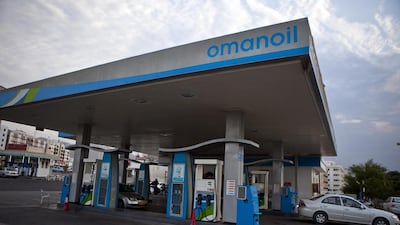MUSCAT // Omanis protesting against rising fuel costs declared victory on Wednesday after the government announced it was capping regular petrol at its current price of 186 Omani baisa (Dh1.8) per litre.
The council of ministers, or cabinet, said it was implementing the price cap to support “deserving citizens” who have been affected by high global oil prices.
The cost of petrol at the pump has increased by almost 75 per cent since the government scrapped its fixed-price policy in January last year – from 114 baisa per litre for regular petrol before the policy was scrapped to 186 baisa this month. On Thursday last week, hundreds of Omanis demonstrated against rising fuel costs outside the ministry of oil and gas in Muscat, saying the extra cost was eating into their pay cheques and calling on the government to put a stop to further increases.
Civil servant Khalifa Al Humaid, who was among those protesting, welcomed Wednesday’s decision.
"I see it as a success and a victory," he told The National. "I am very pleased that the decision to freeze the most popular type of petrol came out just a week after we staged the protest."
The price cap will only affect regular petrol with diesel and super petrol prices still linked to international crude oil prices. A spokesman from the ministry of finance said this was because regular petrol was the fuel most widely used by Omanis, as well as the fuel used by lower-income Omanis who will be most affected by rising fuel prices.
“Only citizens with expensive cars use super petrol and they can afford the fluctuating prices,” he explained.
“Diesel is mainly used by traders and companies can comfortable absorb the extra costs.”
The cabinet decided to remove energy subsidies in January last year in a bid to offset mounting budget deficits amid tumbling global oil prices.
Oman depends heavily on oil revenues, which make up 83 per cent of its total income. But with oil prices falling globally, the country earned an average of just US$39 (Dh143.2) per barrel last year, compared to $66 a year earlier, according to the ministry of finance.
foreign.desk@thenational.ae

